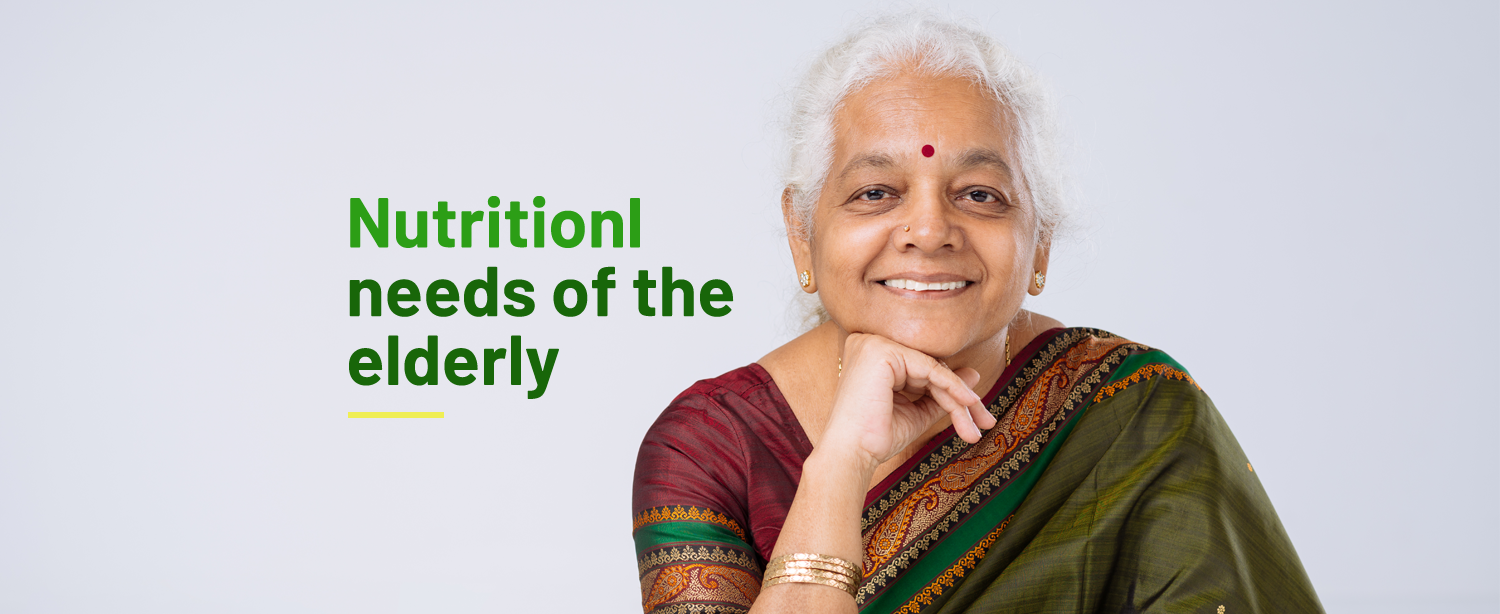Staying away from your parents? Constantly worried about their well-being? Concerned about an elderly family member with poor health? The elderly are more vulnerable to develop chronic health conditions due to their weak immune system and dietary deficiencies. Educate your loved ones about the importance of good nutrition and support them in every possible way to meet their health requirements. A healthy diet helps senior citizens increase their immunity and stay healthy.
Why Nutrition Matters?
After crossing 60 years of age, seniors may need more sleep, less physical exertion, and different types of foods than they needed before. Aging changes one’s nutritional needs and appetite, older people may eat less, but need nutrient-rich meals. The aging process involves changes in the physiological, pathological, social, and psychological conditions of a person. Nutrition is an important element of health among the elderly, and it affects the whole process of aging. As you age, your body becomes less efficient at absorbing some key nutrients and some foods become difficult to chew or digest. Poor nutrition may lead to a decline in various bodily functions, impaired muscle function, decreased bone mass, weakened immunity, reduced cognitive function, poor wound healing, and delayed recovery from surgery.
Nutritional Health Tips for the Elderly
Here are some key nutrients that must be included in the diet of the elderly. These help fight the problems of aging make them resilient:
- Vitamin D is a fat-soluble vitamin involved in bone health, muscle health, immunity, and cognition. Sunlight is the best source, but aging reduces the ability to absorb it well. Speak to your doctor and take a supplement if required.
- Calcium is a mineral involved in bone health, muscle health, nerve transmission, and hormone secretion. Include milk and dairy products, green leafy vegetables, soya bean, broccoli, figs, etc in your diet.
- Vitamin B-6 is a water-soluble vitamin that plays a role in metabolism, immunity, and is involved in over 100 different enzyme reactions in the body. Get your required intake by including a wide variety of different foods like banana, rice, chickpeas, paneer, spinach, etc. in your diet.
- Vitamin B-12 is involved in DNA creation, red blood cell formation, and nerve function. The absorption of vitamin B-12 may decrease with age and seniors are usually recommended fortified foods or supplements.
- Fiber plays an important role in digestion, preventing constipation, and even reducing the risk of heart disease, diabetes, and some cancers. Include plenty of fruits and vegetables in your diet.
- Protein is a macro-nutrient found in every single cell in the body and is very essential for life. Protein also aids in immunity, maintaining muscle, and maintaining physical function in seniors. A protein deficiency can cause malnutrition or muscle loss. Lentils and legumes, eggs, oats, milk and dairy products, nuts and seeds are good sources of protein.
- Getting enough potassium in your diet helps keep your bones strong. This essential mineral is vital for cell function, controls blood pressure levels, and reduces the risk of kidney stones. Fruits and vegetables like bananas, plums, prunes, and potatoes with their skin are rich in potassium.
- Magnesium plays a crucial role in some 300 different physiological processes. Fill your plate with as many unprocessed foods as possible, including fresh fruits, vegetables, nuts, whole grains, beans and seeds, all of which are great sources of magnesium.
- Omega-3 fatty acids are unsaturated fats, that help ease the symptoms of rheumatoid arthritis, slow the progression of age-related macular degeneration (AMD), and also help improve your cognitive skills. Consumption of fish, soybeans, walnuts, flaxseed, chia seeds, and canola oil are helpful.
Do you need a personalized diet plan to help manage certain health conditions? Consult our highly experienced dieticians from the comfort of your home over an online consultation or visit us personally. Our team caters to the needs of the elderly with utmost compassion and expertise. Please find the below website link for further details:
https://www.kokilabenhospital.com/departments/clinicaldepartments/nutritiontherapy.html


